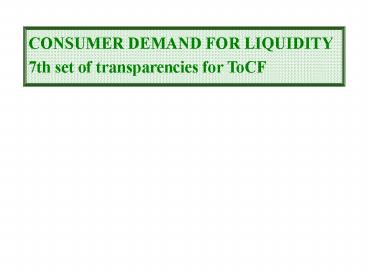TCFset 7
1 / 15
Title:
TCFset 7
Description:
insurers (flatten term structure to reduce cost of impatience): more fragile! 3. I. ... Preferences : if patient, if impatient (but has access to storage ... – PowerPoint PPT presentation
Number of Views:43
Avg rating:3.0/5.0
Title: TCFset 7
1
CONSUMER DEMAND FOR LIQUIDITY 7th set of
transparencies for ToCF
2
Consumers, like firms, may face liquidity shocks.
3 topics I. Financial institutions as ?
liquidity pools fundamental (no
self-provision) ? insurers (flatten term
structure to reduce cost of impatience)
more fragile!
II. Runs
III. Heterogenous consumers and security design.
3
DIAMOND-DYBVIG (1983) - MODEL AND VARIANTS
I.
? Consumer demand
4
? Technological yield curve
with
(no dominance)
Technological yield curve
Self-provision of liquidity is inefficient
(Strong form no financial markets at date 1, not
only lack of planning at date 0).
5
either
or
match maturities with consumptions
if independent shocks
6
? not optimal to perfectly insure
?
Flattening of the yield curve.
7
IMPLEMENTATION
(assume can be verified. See below).
(2) Mutual fund
invests
dividend i1 at date 1.
Impatients consume i1p ( p resale price)
8
Patients get
9
JACKLIN CRITIQUE
?
? General theme markets conflict with optimal
insurance.
back to technological yield curve
DD INSURANCE INCOMPATIBLE WITH EXISTENCE OF
FINANCIAL MARKETS TO WHICH AGENTS HAVE ACCESS.
10
COMPARISON WITH CORPORATE LIQUIDITY DEMAND
?
11
RUNS
II.
Suppose
Preferences if patient, if
impatient (but has access to storage technology
1 ? 1 between dates 1 and 2).
receives
if withdraws,
if does not.
12
ANTI-RUN POLICIES
? suspension of convertibility, ? credit
line, LOLR, ? interbank and other liquidity
markets.
13
HETEROGENEOUS CONSUMER HORIZONS GORTON -
PENNACCHI (1990)
III.
Consumers have different probabilities of
experiencing shock. DD with 3 twists
(1) R uncertain ( or ) not commonly
observed at date 1.
14
To simplify, 2 states
- SUPPOSE ISSUE EQUITY
order flow in state L order flow in state H
price discount (no such discount if only LT
investors buy).
15
- DEBT AS A LOW INFORMATION INTENSITY SECURITY
? Discussion.































